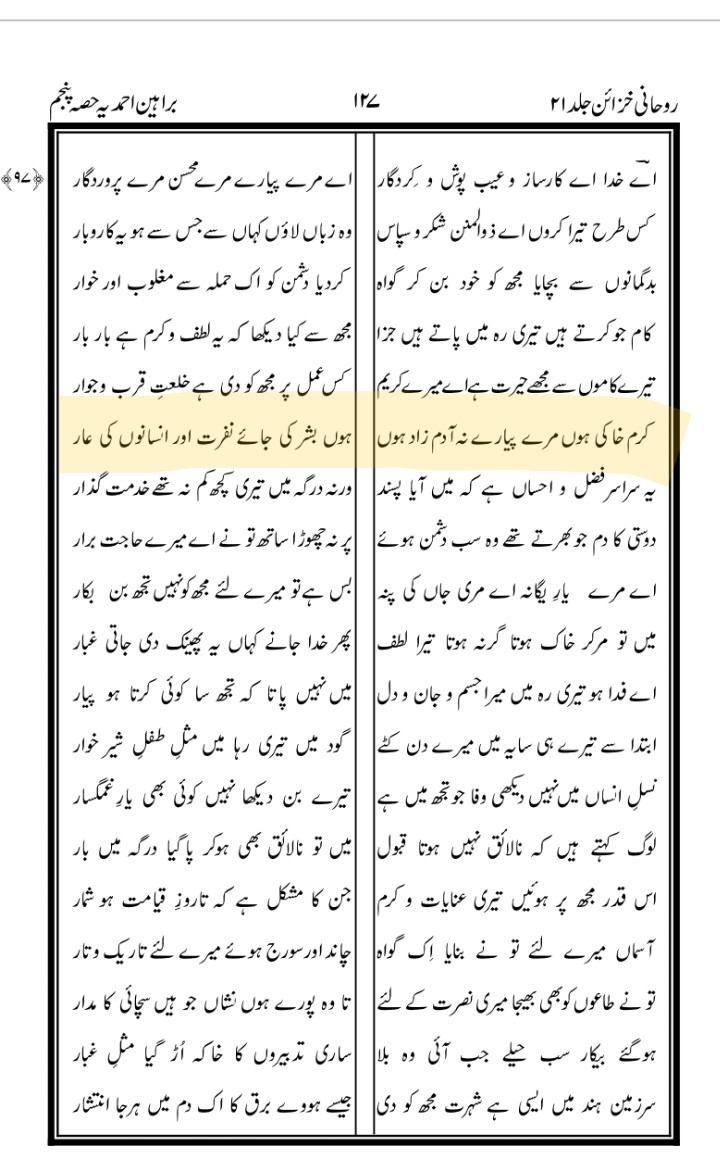The concept of Prophethood has not ended, but rather continues, and new Prophets can come until the Day of Judgment. Let us first look at the verse and its translation, and then scientifically refute the false argument of the Qadianis.
Verse and Translation:
“يٰبَنِیۡۤ اٰدَمَ اِمَّا یَاۡتِیَنَّکُمۡ رُسُلٌ مِّنۡکُمۡ یَقُصُّوۡنَ عَلَیۡکُمۡ اٰیٰتِیۡ ۙ فَمَنِ اتَّقٰی وَ اَصۡلَحَ فَلَا خَوۡفٌ عَلَیۡہِمۡ وَ لَا ہُمۡ یَحۡزَنُوۡنَ”
Translation:
“O children of Adam! If there come to you messengers from among you, reciting to you My verses, then whoever fears Allah and reforms—there will be no fear concerning them, nor will they grieve.”
— Surah Al-A’raf, Ayah 35
The False Argument of the Qadianis:
The Qadianis falsely argue that since this verse addresses the children of Adam in the present tense (using a future verb form), it implies that messengers will continue to come from the children of Adam until the Day of Judgment.
Refuting the False Argument:
There are several answers to this false claim by the Qadianis:
Answer 1:
From the style of the Quran, it is clear that the address to the Ummah of Muhammad (PBUH) is done in two ways:
- When Allah addresses the Ummah to accept guidance, He says, “يٰاَيُّهَا الَّذِينَ آمَنُوا” (O you who have believed).
- When addressing humanity in general for an invitation to Islam, He says, “يٰاَيُّهَا النَّاسُ” (O mankind).
Nowhere in the Quran is the address to the Ummah of Muhammad (PBUH) done using the phrase “يٰبَنِیۡۤ اٰدَمَ” (O children of Adam). Therefore, this verse is addressing all the children of Adam, not specifically the Ummah of Muhammad (PBUH).
Clarification:
Whenever the phrase “يٰبَنِیۡۤ اٰدَمَ” is used to address the children of Adam, any commands or guidance mentioned that are not abrogated or forbidden in the Shari’ah of Muhammad (PBUH) are still applicable to the Ummah of Muhammad (PBUH).
Since according to the Quran and Sunnah, Muhammad (PBUH) is the final Prophet, after his arrival, Prophethood does not continue.
Answer 2:
The term “children of Adam” includes people of all religions, such as Hindus, Sikhs, Christians, and Jews. So, can a prophet come from these people? If not, how do the Qadianis exclude them from this verse’s generalization?
Moreover, the children of Adam include both women and eunuchs. Can a woman or a eunuch be a prophet? If the Qadianis say that women were never prophets before, then they can’t become prophets now.
The argument is: If Prophethood is still ongoing and someone can become a prophet by following a previous prophet, then women could also potentially become prophets. But, as shown, women never became prophets, and likewise, no men can become prophets now.
Answer 3:
If the verse “يٰبَنِیۡۤ اٰدَمَ اِمَّا یَاۡتِیَنَّکُمۡ رُسُلٌ مِّنۡکُمۡ” promises the arrival of messengers, then there is a similar verse “اِمَّا یَأْتِیَنَّكُم مِّنِّي هُدًى” (If guidance comes to you from Me) about the arrival of law-bearing prophets. The Qadianis deny the coming of law-bearing prophets, so they should also deny that any new messenger can come after the final Prophet Muhammad (PBUH).
Answer 4:
The word “إِمَّا” in this verse is a conditional particle. Its fulfillment is not necessarily guaranteed, much like the use of the future tense does not imply continuous or ongoing action. For example, in Surah Maryam, verse 26, it says:
“إِمَّا تَرَیِنَّ مِنَ الْبَشَرِ أَحَدً”
Translation:
“If you see any human being” — implying that it doesn’t mean seeing someone forever.
Therefore, just as this does not imply Maryam (RA) would continue seeing a human being forever, similarly, this verse does not imply that new prophets can continue to come until the Day of Judgment.
Answer 5:
The context of this verse has been explained by the well-known Mujaddid Imam Suyuti (RA), who narrated from Abi Yasaar Salmi that Allah Almighty took Adam (AS) and his offspring in His grasp and said:
“يٰبَنِیۡۤ اٰدَمَ اِمَّا یَاۡتِیَنَّکُمۡ رُسُلٌ مِّنۡکُمۡ”
Then, Allah looked upon the messengers with mercy and said, “يٰاَيُّهَا الرُّسُلُ” (O Messengers). This confirms that the verse refers to a pre-earthly event, which cannot be used to argue that Prophethood continues after the Prophet Muhammad (PBUH).
Answer 6:
In the same section of the Quran, three times before this verse, Allah addresses the children of Adam. Therefore, looking at the context, it is clear that this verse also refers to the initial children of Adam, not the Ummah of Muhammad (PBUH).
Answer 7:
Even if one were to accept that the verse implies that prophets could come after Muhammad (PBUH), it does not establish Mirza Qadiani as a prophet, since he himself claimed that he was not even human:

“كَرَم خَاکِی ہوں، مِیرے پیارے نہ آدم زاد ہوں، ہوں بشر کی جائے نفرت اور انسانوں کی عار”
(Ruhani Khazain, Volume 21, page 127)
Conclusion:
In summary, this verse, and no verse in the Quran, supports the idea that Prophethood continues. The verse merely addresses the early children of Adam, and there is no indication that Prophethood will continue after Prophet Muhammad (PBUH).